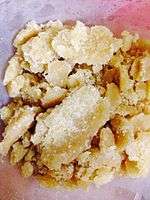Murabba
|
Peach murabba | |
| Course | Dessert |
|---|---|
| Region or state | Caucasus, West Asia, Central Asia, South Asia |
| Main ingredients | fruits or berries, sugar |
|
| |
Murabba[1] (from Arabic: مربة, mirabba "jam", "fruit preserves"; Armenian: մուրաբա, muraba, Azerbaijani: mürəbbə, Georgian: მურაბა, muraba, Hindi: मुरब्बा, murabbā, Persian: مربا, morrabâ, Tajik: мураббо, murabbo, Urdu: مربا, Uzbek: 'murabbo') refers to sweet fruit preserve which is popular in many regions of Caucasus, Central and South Asia. It is traditionally prepared with fruits, sugar, and spices.
Fruit murabba
A popular fruit that is candied is apple, apricot, gooseberry (amla), mango, plum, quince which can be preserved for long periods both as a wet murabba and a dry version, and is said to have medicinal properties.[2] It is widely used in Indian traditional and folk medicine.
Allam murabba

Allam Murabba (ginger brittle) is made from ginger, sugar etc. It is cooked and cut into round pieces. Allam in Telugu language is ginger, hence the name.
In Caucasus
Murraba in Caucasus is made of strawberries, cherries and local fruits. When the Georgians travelled to India, they adapted the recipe to use the local mango, which became a traditional favorite of the Gujaratis over the years. Georgians make murraba once a season and fill their pantries with bottled murraba.
Murabba (jam) is the main dessert at Azerbaijan's table, which is served at every tea party. Nothing can take the place of this wonderful jam for Azerbaijanis.Besides all these, murabba is used for treating colds. Such kinds of murabba as dogwood, blackberries, currants, rich with vitamin C in the Azerbaijani houses usually serve as the first aid during the flu.
Similar products
Similar confections are also made in Eastern Europe (Belarus, Russia, and Ukraine), where they are called varenye.
References
| Look up murabba in Wiktionary, the free dictionary. |
- ↑ Also muraba, murraba or murrabo
- ↑ http://www.hindu.com/mp/2003/01/29/stories/2003012900130401.htm
